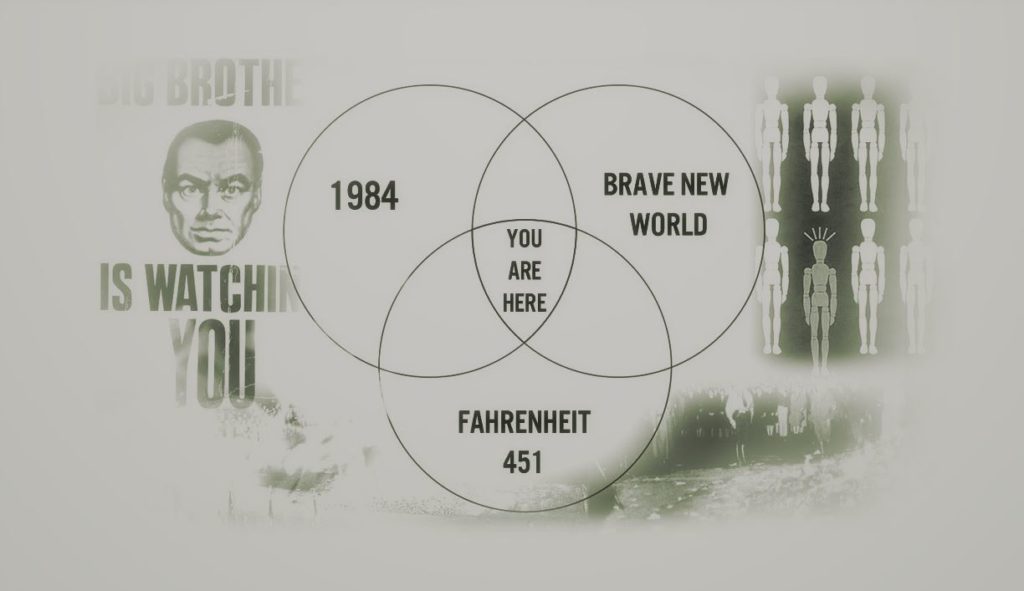Even if it has been a while since you read Fahrenheit 451, you might remember Ray Bradbury’s classic for its portrayal of a dystopian future in which an authoritarian government burns books.
Read Fahrenheit 451 again to discover why people wanted their tyrannical government to burn books. Bradbury wrote Fahrenheit 451 in 1953, yet the parallels to today’s social climate for censorship are haunting.
Bradbury’s protagonist is Guy Montag, who, like all firemen in Bradbury’s future, burns books.
In Bradbury’s dystopia, firemen became “custodians of our peace of mind, the focus of our understandable and rightful dread of being inferior; official censors, judges, and executors.”
Today’s mainstream and social media are “custodians of our peace of mind” as they filter out “conflicting theory and thought.” Captain Beatty is Montag’s boss. Beatty explained, “If you don’t want a man unhappy politically, don’t give him two sides to a question to worry him; give him one.”
If you don’t want people debating questions such as Covid-19 policy, Beatty has the ticket: “Cram them full of noncombustible data, chock them so damned full of ‘facts’ they feel stuffed, but absolutely ‘brilliant’ with information. Then they’ll feel they’re thinking, they’ll get a sense of motion without moving.”
Today, millions listen daily to reports of case counts of Covid-19. Like Bradbury predicted, listeners can recite the numbers but have no context to make sense of the numbers. Many have little idea that important scientists and doctors have advocated alternatives to lockdowns that could save lives and abate catastrophic impacts on economies. As in Bradbury’s world, many are working tirelessly to disparage and censor alternative views.
After Montag questions his role as a book burner, he recites Dover Beach by Matthew Arnold to neighbors. His neighbors were shocked at the feelings the poem provoked. One cries out, “Silly words, silly words, silly awful hurting words… Why do people want to hurt people? Not enough hurt in the world, you’ve got to tease people with stuff like that!”
Incredibly, Bradbury anticipated today’s social climate where people claim censorship is justified because someone hurt their feelings.
Beatty explains a dominant social norm justifying censorship: Do not offend minorities. Bradbury is clear; “minorities” meant practically everyone:
Don’t step on the toes of the dog-lovers, the cat-lovers, doctors, lawyers, merchants, chiefs, Mormons, Baptists, Unitarians, second-generation Chinese, Swedes, Italians, Germans, Texans, Brooklynites, Irishmen, people from Oregon or Mexico.
Pretending you can “stay happy all the time” was another social norm driving popular demand for censorship in Fahrenheit 451. Beatty explains,
[Censorship] didn’t come from the Government down. There was no dictum, no declaration, no censorship, to start with, no! Technology, mass exploitation, and minority pressure carried the trick, thank God. Today, thanks to them, you can stay happy all the time, you are allowed to read comics, the good old confessions, or trade journals.
In Bradbury’s dystopia, to consider conflicting theories makes for unhappiness, so Beatty lauds the fireman’s mission and justifies censorship:
The important thing for you to remember, Montag, is we’re the Happiness Boys, the Dixie Duo, you and I and the others. We stand against the small tide of those who want to make everyone unhappy with conflicting theory and thought. We have our fingers in the dyke. Hold steady. Don’t let the torrent of melancholy and dreary philosophy drown our world. We depend on you. I don’t think you realize how important you are, we are, to our happy world as it stands now.
